This 2025 Oscar Micheaux Blu-ray release by Kino Lorber is the most groundbreaking collection since Criterion’s Complete Varda set in 2020. Both have made the directors’ works much more accessible to the public. The review below is based on a five-star (*****) system, modeled from my review on Blu-ray.com.
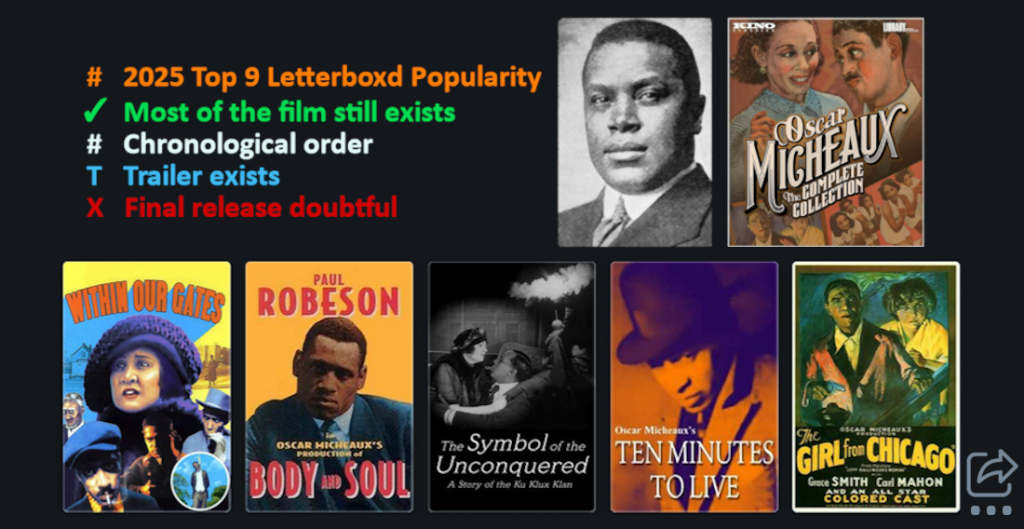
Review *****
To give it the attention it deserves, I’ve taken several months to watch (sometimes rewatch) all the films and trailers in the set, released in February 2025. (Note that these are only the 17 extant films or trailers, less than half of his truly “complete” filmography.)
Oscar Devereaux Micheaux (b. “Michaux” in Metropolis, IL 1884, d. 1951) was hands-down the most important Black filmmaker of the early 20th century. And he was the only writer/director/producer to continue making his own films (approximately 38), from 1919-1948.
It’s impossible to encapsulate Micheaux’s work in a short review like this, but his films were entertaining while also tackling issues such as miscegenation, “passing,” urban versus rural life, lynching, and the struggle of Black excellence. While we face many of the same issues today, watching his films can often be confusing. The culture was very different, and his intentions weren’t always clear. With his limited production resources, it can take some time for us viewers 100 years later to understand the plot and themes of his films.
But Micheaux was a true auteur. For more about his remarkable life, writings, and films, there are several biographies available in print. Kino Lorber has also just released a new documentary on DVD: Oscar Micheaux: The Superhero of Black Filmmaking. I watched it during my Micheaux journey this year—you can read my review, as well as reviews and technical details of each film in the “Complete” set (15 including 2 trailers, plus 2 more films where only the trailer exists now), here: https://letterboxd.com/zepfanman/tag/oscar-micheaux/reviews/
More than just Micheaux, though, it’s been a journey discovering the actors he employed. Only a few have biographies online, so I’ve done what I could to add to the knowledge base with my limited free time. See my Ten Minutes to Live review as an example. So many of his actors don’t even have IMDb photos. There are plenty of accolades for classic Hollywood actors in this era, but we also deserve to know the famous Black entertainers from Harlem and Chicago in his films.
I can’t recommend this set enough. While more than half of Micheaux’s films are currently lost, perhaps there is a chance that this new collection will inspire archivists and collectors to search for his lost films. The current scholarship on these works is only scratching the surface. Personally, working my way through this collection has shed a light on the era of “race films” that have largely been ignored over the past 60+ years. They are an incomparable record of Black American entertainment in the first half of the 20th century.
Filmography infographic
At-a-glance image of Micheaux’s film posters, with Letterboxd Popularity rankings, trailer availability, and notation on the two films that were likely never completed. Popular global classic films shown on the right, concurrent to the Micheaux films on each row (Caligari, Sherlock Jr, Gold Rush, Metropolis, Frankenstein, Duck Soup, Snow White, and It’s a Wonderful Life).
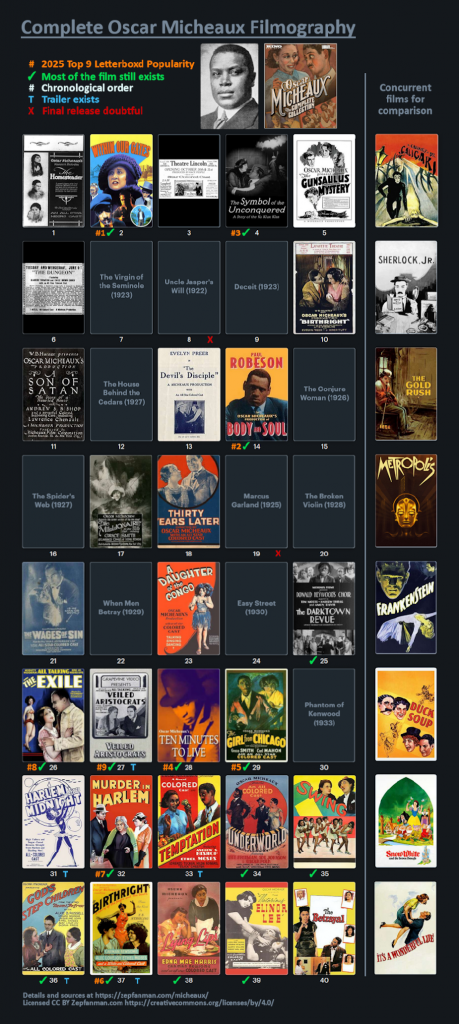
Based primarily on the well-researched book, Oscar Micheaux and His Circle: African-American Filmmaking and Race Cinema of the Silent Era (2001, IU Press, eds. Pearl Bowser, Jane Gaines, and Charles Musser). It’s available to borrow for free on Archive.org. Another good biography is Oscar Micheaux: The Great and Only (2008, HarperCollins, Patrick McGilligan).
I’ve made a sortable version of this list on Letterboxd.com. Release dates often debatable. Below, linked films go to my review on Letterboxd. Unlinked films are considered lost. There are newspaper reports of the RELEASE UNLIKELY films “coming soon,” but no evidence that they were ever released.
- The Homesteader (1919)
- Within Our Gates (1920)
- The Brute (1920)
- The Symbol of the Unconquered (1920)
- The Gunsaulus Mystery (1922)
- The Dungeon (1922)
- The Virgin of the Seminole (1923)
- 7.a. RELEASE UNLIKELY: Uncle Jasper’s Will (1923) aka Casper Olden’s Will aka Jasper Landry’s Will
- 7.b. RELEASE UNLIKELY: A Fool’s Errand (1923)
- Deceit (1923) includes a film-within-the-film called The Hypocrite.
- Birthright (1924)
- A Son of Satan (1924) aka The Ghost of Tolston’s Manor
- The House Behind the Cedars (1924)
- The Devil’s Disciple (1925)
- Body and Soul (1925)
- The Conure Woman (1926)
- The Spider’s Web (1926)
- The Millionaire (1927)
- 16.a. RELEASE UNLIKELY: Marcus Garland (1928) aka Black Magic aka Napoleon
- Thirty Years Later (1928)
- The Broken Violin (1928)
- Wages of Sin (1929)
- When Men Betray (1929)
- A Daughter of the Congo (1930) PART “TALKIE”
- Easy Street (1930) PART “TALKIE”
- The Darktown Revue (1931) SHORT “TALKIE”
- The Exile (1931) HIS FIRST FULL SOUND FEATURE
- Veiled Aristocrats (1932) & TRAILER
- Ten Minutes to Live (1932) which I also reviewed in 2020.
- The Girl from Chicago (1932)
- Phantom of Kenwood (1933)
- Harlem After Midnight (1934) TRAILER ONLY
- Murder in Harlem (1935) aka Lem Hawkins’ Confession aka Brand of Cain
- Temptation (1937) TRAILER ONLY
- Underworld (1937)
- Swing! (1938)
- God’s Step Children (1938) & TRAILER
- Birthright (1939) & TRAILER
- Lying Lips (1939)
- The Notorious Elinor Lee (1940)
- The Betrayal (1948)
Video quality ****
None of these compare to big-budget Hollywood restorations. Micheaux never secured enough money to produce a technically-excellent film to begin with. And all of his films required cuts by censors at the time. Body and Soul (1925) is probably the most complete film of his that we still have today—all his others are highly-edited from the director’s original vision. Fortunately, the plots still make sense in what remains. The films with major omissions are noted by restoration teams with intertitles or subtitles. I’m including film runtime directly from the discs (not IMDb or other sources).
The transfer quality is essentially as good as it gets, with 2K, 4K, or HD scans. It looks like they’ve all received minor digital cleanup, likely just from dupe prints. Most of the titles that were in the Pioneers set from 2016 look essentially the same in this new collection.
- Compared to the 2016 set, there’s slightly more grain and density on the 2025 set. It’s really only noticeable if you compare screenshots closely.
- Within Our Gates (1920, 74 min) reportedly received a NEW 4K scan, but it looks very similar to the 2016 transfer, with a slight uptick in detail.
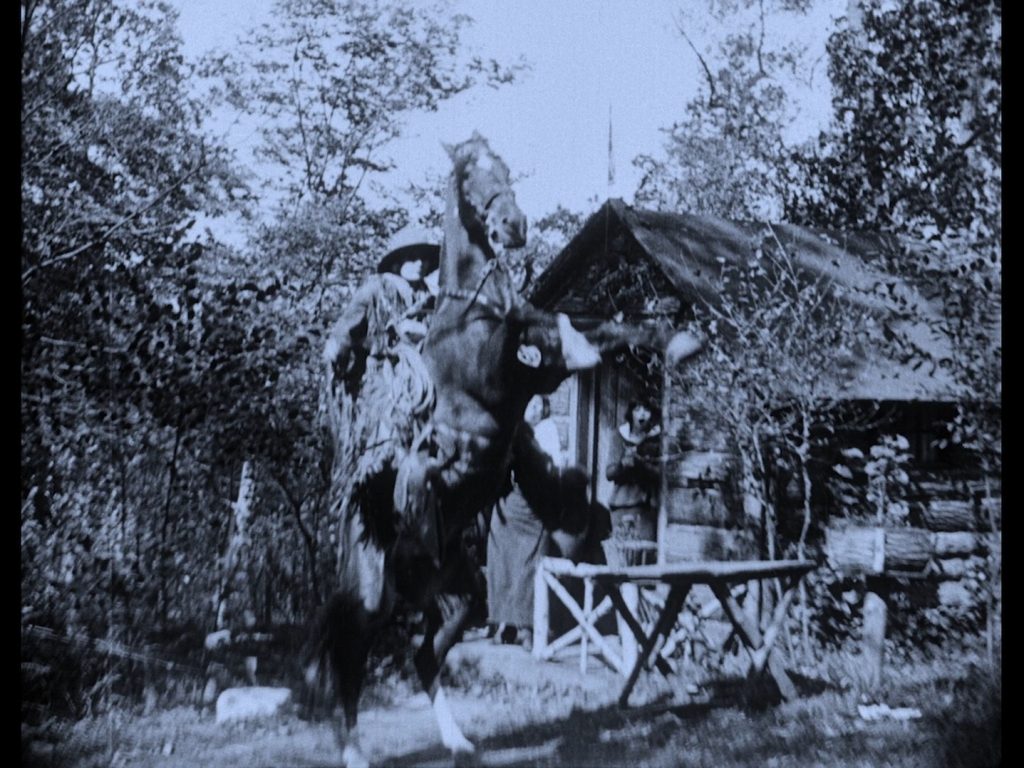
- The Symbol of the Unconquered (1920, 59 min) received a NEW 4K restoration. It’s similar to the 2016 release, but stabilized a little more. It has also been color-graded in HD for the first time, to match the original tinting. Some of the intertitles have been reworded, compared to previous releases.
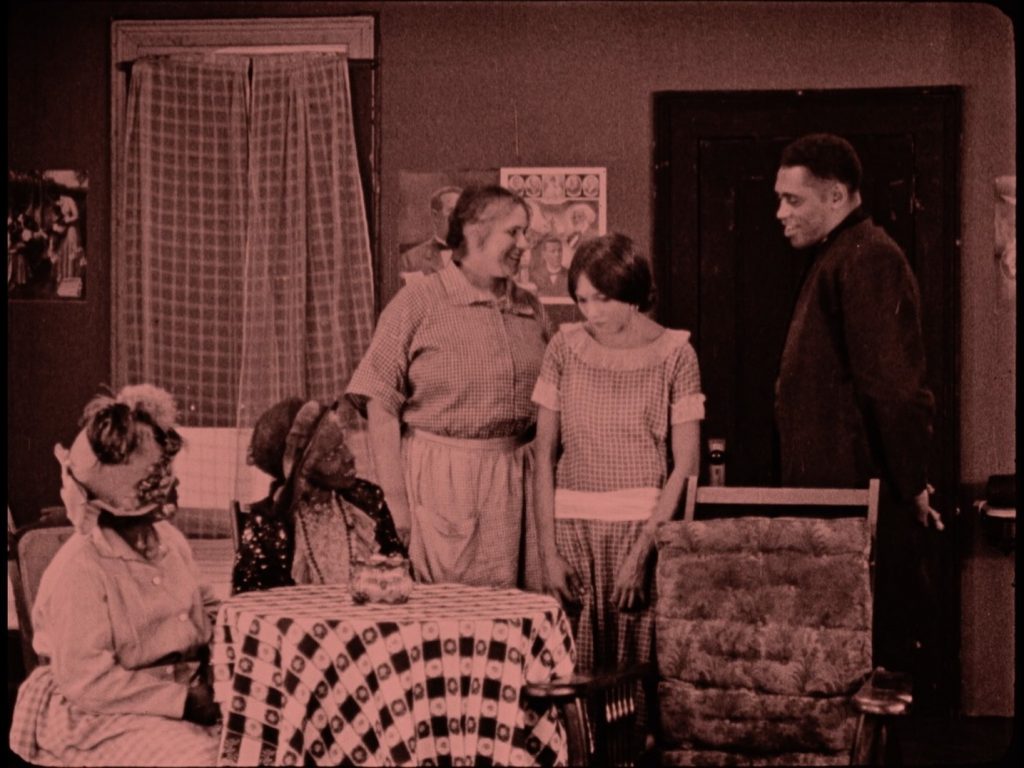
- Body and Soul (1925, 95 min, color tinted) received a NEW 4K restoration, but it’s nearly identical to the 2016 Blu-ray. There is more detail around the edges now, and the tinted colors are more saturated. For some reason, it’s slightly slowed down (including the audio) and is almost 2 minutes longer than the 2016 release.
- The Darktown Review (1931, 19 min) contains subtitles, but many of the lyrics were “unintelligible” to the subtitler.
- The Exile (1931, 79 min) 2K scan. Contains subtitles, but many of the song lyrics were “unintelligible” to the subtitler.
- Veiled Aristocrats (1932, 44 min) received a NEW 4K scan, but looks essentially the same as the 2016 Blu-ray.
- Ten Minutes to Live (1932, 58 min) 2K scan. The title screen has “from three short stories” but only two chapters remain of the extant film. There are many misspellings in Micheaux title cards, but “Galle & George” as the minstrel comedy duo seems to be correct; the subs on the Blu-ray introduce them as Gabby & George, which is probably incorrect.
- The Girl from Chicago (1932, 71 min) contains subtitles, but many of the song lyrics were “unintelligible” to the subtitler.
- Murder in Harlem (1935, 96 min) NEW TO BLU-RAY, 4K restoration. Much better quality than previous transfers.
- Underworld (1937, 77 min) NEW TO BLU-RAY, 2K restoration and much better quality than any previous releases.
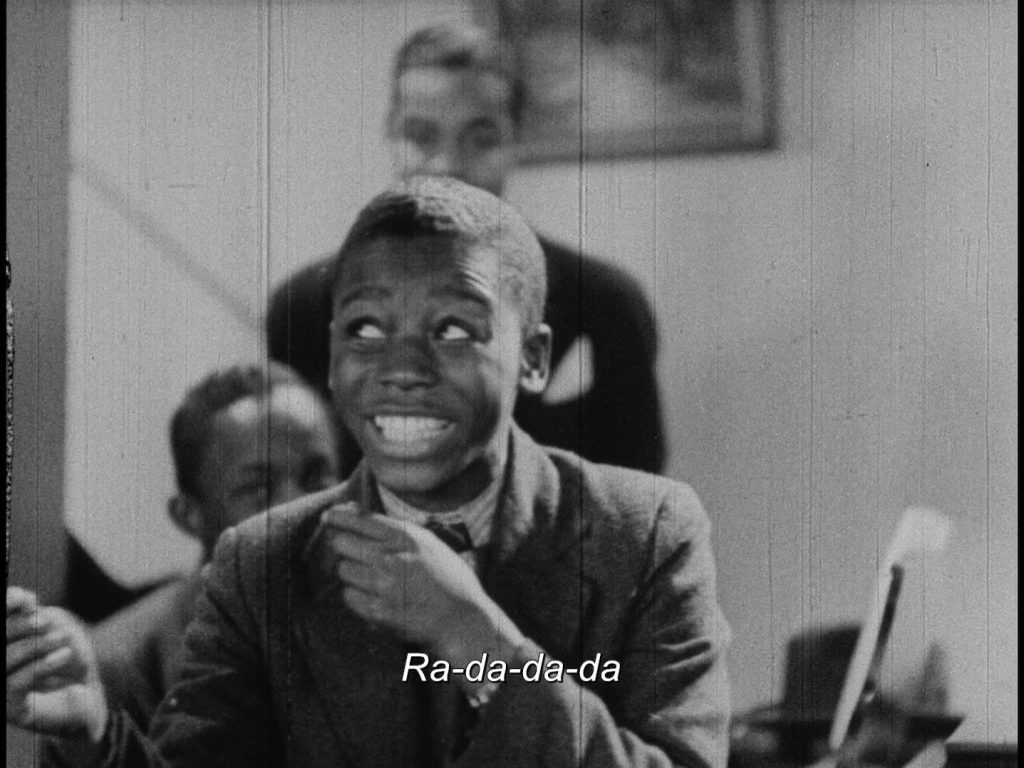
- Swing! (1938, 69 min) NEW TO BLU-RAY, 2K scan, but apparently not restored. It still looks relatively good, though.
- God’s Step Children (1938, 71 min) NEW TO BLU-RAY, 4K scan, although there is limited scratch cleanup and stability.
- Birthright (1938, 74 min) is nearly identical to the restoration in the 2016 set.
- Lying Lips (1939, 73 min) NEW TO BLU-RAY, 2K restoration. Marginally better resolution over previous transfers, and additional (although inessential) short scenes.
- The Notorious Elinor Lee (1940, 73 min) NEW TO BLU-RAY, 2K restoration. Good scan quality, but from a worn-out source.
Audio quality ***
See notes above about subtitles. Most of the audio and soundtracks are identical to the 2016 Pioneers set. This *** review addresses the state of the existing audio elements, not Kino Lorber’s restoration efforts. For the Blu-ray production, I would give **** for vastly improving the sound from previous releases, even though many of Micheaux’s films will likely never have a crystal clear restoration.
- Within Our Gates (1920): Score by DJ Spooky, with drums, guitar, and piano.
- The Symbol of the Unconquered (1920): I believe this is a brand NEW piano score from Andrew Earle Simpson.
- Body and Soul (1925): Jazz score by DJ Spooky, with drums, piano, tenor sax, and upright bass.
- Veiled Aristocrats (1932) received NEW audio cleanup. Better than the 2016 restoration, but I would still recommend subtitles since the original production had poor sound design.
- Murder in Harlem (1935) NEW TO BLU-RAY with much better sound quality than previous transfers.
- Underworld (1937) NEW TO BLU-RAY with much better sound quality than previous transfers, which were nearly unintelligible. The segment from 65 to 67 minutes contains subtitles since the audio is so garbled.
- The Notorious Elinor Lee (1940) NEW TO BLU-RAY, with extensive audio cleanup—but the segment from 49 to 53 minutes contains subtitles since the audio is so garbled.
Bonus content **
While it looks like there is a lot of bonus material, it’s actually quite minimal when you dig into it. I would give it ***, but there are several factual errors, noted below.
- Trailers are of varying quality, but none look stellar. Trailers for Veiled Aristocrats (4 min, which shows additional scenes not in the existing feature film) and Birthright (4 min) are identical to the 2016 set. NEW trailers not in 2016 set:
- Harlem After Midnight (1934, 3 min, feature film is lost)
- Temptation (1937, 3 min, feature film is lost)
- God’s Step Children (1938, 4 min)
- 2024 Theatrical Re-release Trailer (2 min, also on YouTube). The segment from the short “Screen Snapshots” episode from 1920 is NOT included in this set. It was on the 2016 Kino box and showed Micheaux on set (likely filming The Brute, in early 1920).
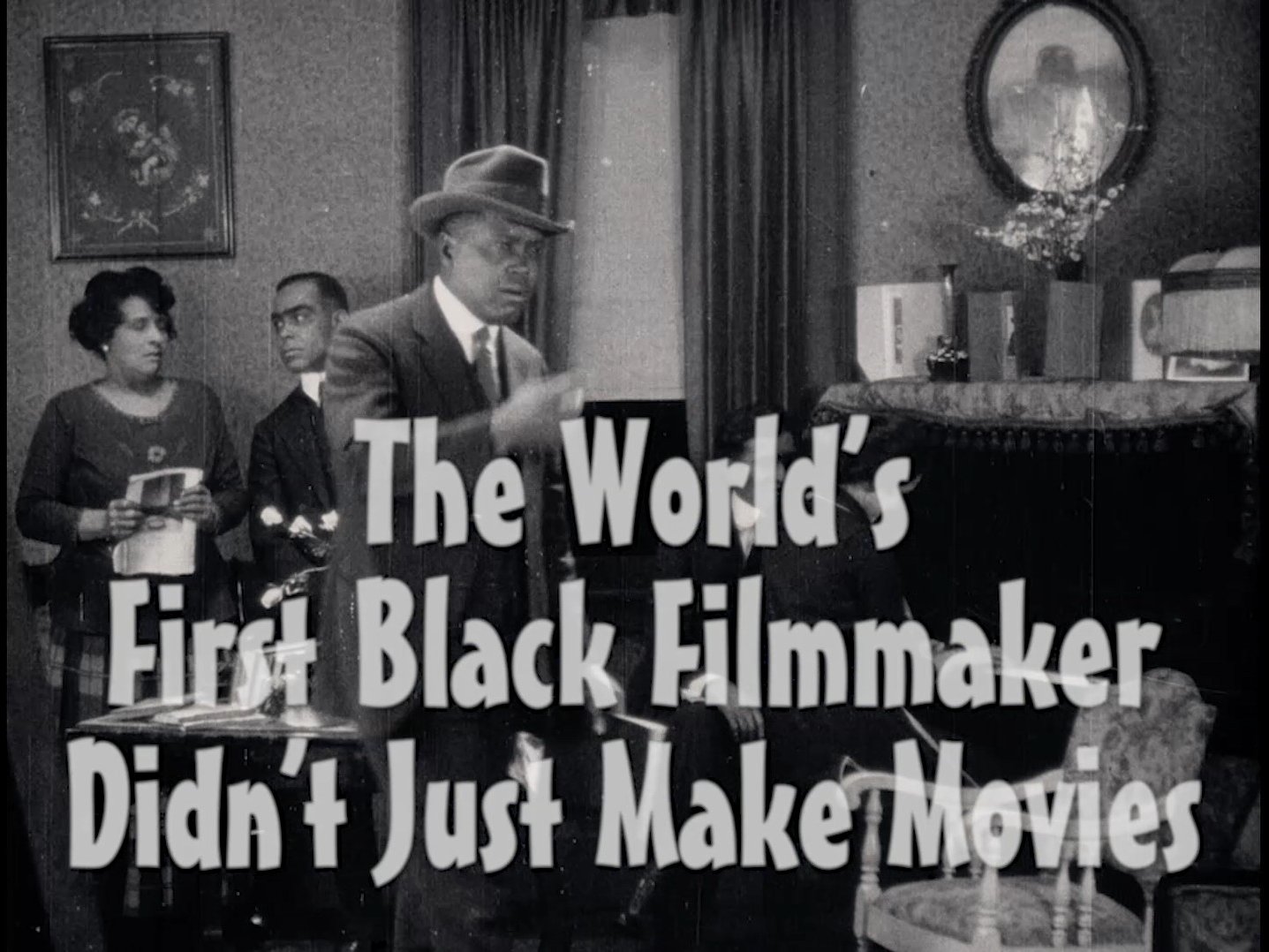
- Each disc includes a short introduction (1 to 9 minutes) by series curator and film historian Rhea L. Combs, including clips from Micheaux’s films and photos throughout his life.
- 11-page booklet contains short summaries of each film, 4K, 2K, or HD restoration notes, and a few photos. In Ten Minutes to Live, Lawrence Chenault and A.B. DeComathiere are identified with the wrong character names. Keep in mind that release dates can vary; Birthright for example, may have been 1938 or 1939.
- Perhaps due to the extended use of blackface, The Darktown Review is not included in Kino Lorber’s publicity. It is the shortest film in the set, so it could be considered bonus content.
- Packaging: Sturdy single-sized standard Blu-ray case, with 5 discs included.
The set is available on Blu-ray (no DVDs) as Oscar Micheaux: The Complete Collection.